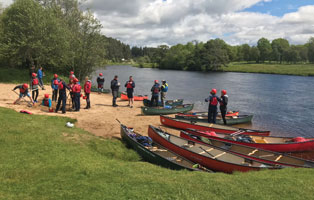
Far beyond any of our memories, our predecessors spent most of their day outside. Nature was where they spent their free time, worked and ate.
Anecdotally, immersing ourselves in the sights, smells and sounds of nature helps us to clear and focus our mind. I certainly feel that way after a hill walk in my West Scotland surroundings when I see the diverse ecosystem stretching out before me, but there are also numerous studies that evidence this. For example, a study by the National Trust revealed that people who spent time listening to woodland sounds reported a 30 per cent increase in feeling relaxed. Research by the University of East Anglia noted that being outdoors has health benefits such as reducing the risk of cardiovascular disease and levels of salivary cortisol, a marker for stress. More generally, research from the DofE also highlights the mental wellbeing benefits of co-curricular activities for young people: 62 per cent of participants said the DofE made them more confident in overcoming difficult situations, 61 per cent felt more independent as a result of doing the DofE, and 47 per cent said the expedition made them physically fitter and healthier.
Iain Loudon, Teacher of English and DofE Award Manager at Fettes College, says: ‘The benefits of getting outdoors are physical fitness, mental buoyancy and resilience. The physical fitness that comes from extended exercise is obvious and the buzz from endorphins is well known, but the mental health benefits are also real. When young people become used to being outside, they will continue to seek refreshment outside in the future.’
At St George’s School for Girls, outdoor activities are an important part of the school’s all-round education which includes an outdoor learning programme, walks and camping. Joanna Mushat, Deputy Head of Sixth Form and DofE Manager, believes that outdoor activities are particularly valuable for those who do not excel in the classroom: ‘All students can find that they have excellent leadership skills, can inspire others, and succeed in this environment.’
On top of health and wellbeing benefits, outdoor activities provide opportunities for young people to enhance attributes they learn in school. For example, DofE participants have the chance to develop confidence, resilience and teamwork across all activity sections – volunteering, skills, physical, expedition and residential. Coaching younger children in sports, learning gardening skills or going on a sailing residential can foster a sense of achievement. In short, getting outdoors can help young people believe in themselves more.
Joanna sees first hand how getting outdoors benefits young people. From her perspective, being out in nature provides young people with the opportunity to ‘learn to be in an environment they’re not familiar with, appreciate nature and challenge themselves to do something different’. For Iain, it’s also about balance – while academic learning is important, ‘education is just part of life and there’s more to life than being inside’.
The benefits of getting outdoors for young people are clear but it can be hard to leave the warmth and security of indoors, especially if their vision of the outdoors is hikes and mountains!
Here are a few simple ideas to try, to encourage children to get that breath of fresh air: boarding schools are really good at encouraging these sorts of activities.
I will leave you with a comment from Harry, a DofE Gold Award participant, shared with us last year, during the coronavirus pandemic: ‘When lockdown started, I was scared to leave my house and struggled to find anything good in life. I have autism and a rare genetic condition which heightened my anxieties. For my DofE volunteering, I grew vegetables in my allotment to share with local people who were shielding. Doing this helped me feel less anxious and more confident. Speaking to other allotment holders from a distance has helped me learn to socialise safely. Being outdoors helps me relax and stay calm.’
Subscribe / latest articles and news from our schools